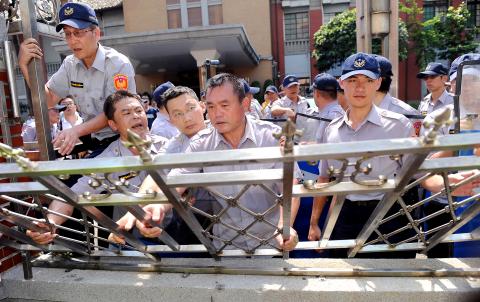Student protesters clashed with police several times yesterday, pulling down a steel gate outside the Legislative Yuan as they tried to force their way into a public hearing on the cross-strait service trade pact after their request to attend the meeting was turned down.
Arriving before the start of the public hearing at the legislature’s Internal Administration Committee at 9am, more than 100 students representing over a dozen universities across the nation rallied outside the legislature, asking that they be let in when greeted by closed gates and rows of police officers with shields.
The students tried to negotiate by presenting a list of representatives, hoping that at least a few of them would be allowed into the meeting, but their request was turned down by Chinese Nationalist Party (KMT) Legislator Johnny Chiang (江啟臣), who presided over the meeting.

Photo: Lo Pei-der, Taipei Times
“We are students now, but in a few years, we will be graduating and will join the work force; hence, the service trade agreement could have an impact on our future employment. This is why we want to take part in the meeting, to listen and to express our opinions,” National Taiwan University (NTU) student Huang Shou-ta (黃守達) told the crowd. “In fact, this is something that could affect everyone in this country. The public should be allowed to take part in the public hearing, instead of having only a number of businesspeople who would benefit from it and academics who support the agreement at the meeting.”
“We are citizens of this country. Taking part in a public hearing and discussing public policy is our right,” said Lin Fei-fan (林飛帆), another NTU student.
However, as the legislature failed to respond positively to their request, the protesters grew impatient.
At 9:08am, some of the students tried to climb over the gate, while the rest chanted: “Open the gate!”
Police on the other side of the gate tried to push them back, but about 20 protesters, with the help of fellow students, managed to get in. However, they were quickly tackled by officers and escorted out after police took down their names.
The students did not give up, and an hour later, made a second attempt to get in.
While the police were on full alert this time, some of the protesters managed to pull down part of the gate and rushed toward the legislative building.
Another round of pushing and shoving ensued, with several protesters saying they were injured and later sent to hospital. Those who got in were also soon dealt with.
“These young student absolutely have the right to have a say about the agreement, because they are the ones who will have to shoulder the consequences in the next 50 years or so,” said Frida Tsai (蔡培慧), an assistant professor at Shih Hsin University who came to support her students. “Police in a democratic country should help defend the democracy, not a government that sells out public interests.”
“Free trade benefits only capitalists and big corporations, never the people — just look at how our lives have not gotten better after Taiwan joined the WTO,” she added.

Conflict with Taiwan could leave China with “massive economic disruption, catastrophic military losses, significant social unrest, and devastating sanctions,” a US think tank said in a report released on Monday. The German Marshall Fund released a report titled If China Attacks Taiwan: The Consequences for China of “Minor Conflict” and “Major War” Scenarios. The report details the “massive” economic, military, social and international costs to China in the event of a minor conflict or major war with Taiwan, estimating that the Chinese People’s Liberation Army (PLA) could sustain losses of more than half of its active-duty ground forces, including 100,000 troops. Understanding Chinese

The Ministry of Foreign Affairs (MOFA) yesterday said it is closely monitoring developments in Venezuela, and would continue to cooperate with democratic allies and work together for regional and global security, stability, and prosperity. The remarks came after the US on Saturday launched a series of airstrikes in Venezuela and kidnapped Venezuelan President Nicolas Maduro, who was later flown to New York along with his wife. The pair face US charges related to drug trafficking and alleged cooperation with gangs designated as terrorist organizations. Maduro has denied the allegations. The ministry said that it is closely monitoring the political and economic situation

UNRELENTING: China attempted cyberattacks on Taiwan’s critical infrastructure 2.63 million times per day last year, up from 1.23 million in 2023, the NSB said China’s cyberarmy has long engaged in cyberattacks against Taiwan’s critical infrastructure, employing diverse and evolving tactics, the National Security Bureau (NSB) said yesterday, adding that cyberattacks on critical energy infrastructure last year increased 10-fold compared with the previous year. The NSB yesterday released a report titled Analysis on China’s Cyber Threats to Taiwan’s Critical Infrastructure in 2025, outlining the number of cyberattacks, major tactics and hacker groups. Taiwan’s national intelligence community identified a large number of cybersecurity incidents last year, the bureau said in a statement. China’s cyberarmy last year launched an average of 2.63 million intrusion attempts per day targeting Taiwan’s critical

‘SLICING METHOD’: In the event of a blockade, the China Coast Guard would intercept Taiwanese ships while its navy would seek to deter foreign intervention China’s military drills around Taiwan this week signaled potential strategies to cut the nation off from energy supplies and foreign military assistance, a US think tank report said. The Chinese People’s Liberation Army (PLA) conducted what it called “Justice Mission 2025” exercises from Monday to Tuesday in five maritime zones and airspace around Taiwan, calling them a warning to “Taiwanese independence” forces. In a report released on Wednesday, the Institute for the Study of War said the exercises effectively simulated blocking shipping routes to major port cities, including Kaohsiung, Keelung and Hualien. Taiwan would be highly vulnerable under such a blockade, because it